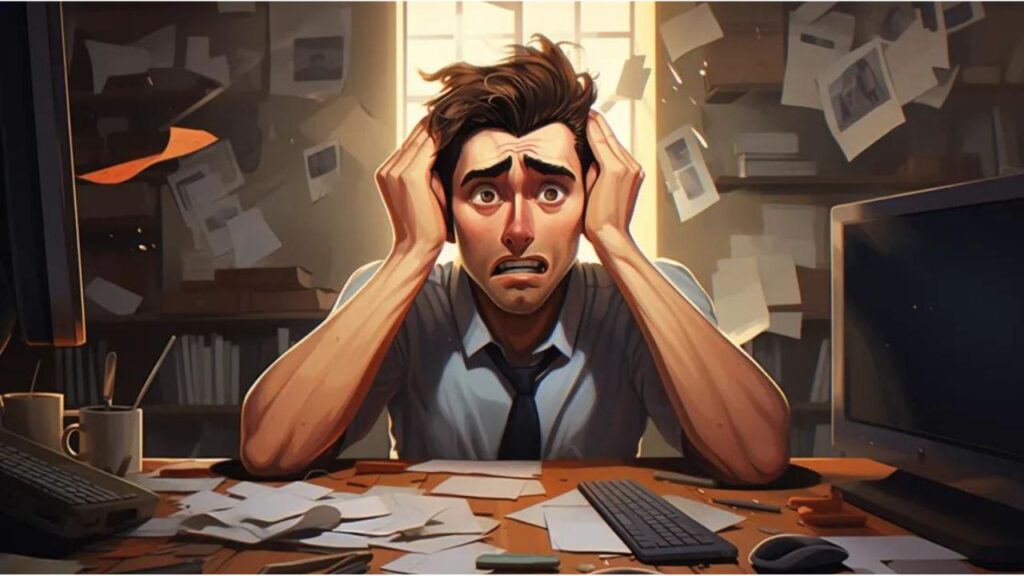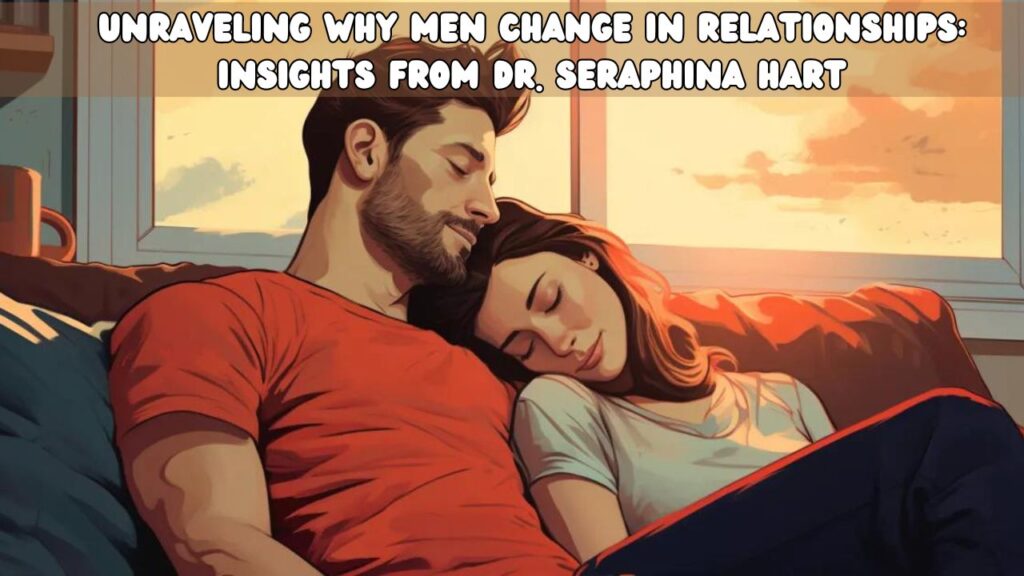Message to Dr. Hart
From: Sarrah
Age: 32
Partner: 35
Duration: 2 years
From: United Kingdom
Hi Dr. Hart,
I’m Sarah, 32, from the UK. My partner, who is 35, seems to have changed a lot since we first started dating two years ago. He used to be more attentive and emotionally open, but now he seems distant and less interested. I’m struggling to understand why he has changed. Can you shed some light on why does a man change in a relationship?
Dr. Seraphina Hart’s Response:
Dear Sarah,
Firstly, I want to acknowledge the confusion and concern you must be feeling about the changes you’re observing in your partner. Witnessing a shift in your partner’s behavior can be unsettling, and it’s natural to seek understanding. The dynamics of relationships are complex, and changes in behavior are not uncommon. Let’s explore some possible reasons for these changes and how you can approach this situation.
Understanding Behavioral Changes in Men

In any relationship, understanding the nuances of your partner’s behavior is key to maintaining a healthy connection. When it comes to men, certain behavioral changes can be puzzling. It’s crucial to look at these changes not just in isolation but as part of the broader context of your relationship’s evolution and the challenges of everyday life.
Evolution of the Relationship
Every relationship undergoes changes as it matures. The initial stages are often marked by a period colloquially known as the ‘honeymoon’ phase. This phase is characterized by heightened romantic interest, intense emotions, and a strong desire to connect and impress one another.
Transition to Stability
As the relationship progresses, it naturally shifts from this initial exhilaration to a more stable, routine phase. This transition can sometimes be mistaken for a loss of interest. However, it’s important to recognize that this change is often a sign of the relationship maturing into a more sustainable form. It reflects a shift from infatuation to a deeper, more secure form of love.
Managing Expectations
During this phase, partners may seem less attentive or romantic than before, but this is usually a sign of comfort and security in the relationship. It’s a phase where deeper bonds are formed, and understanding this can help in adjusting your expectations and appreciating the more subtle, enduring forms of affection and connection that develop over time.
Communication Dynamics
Another critical aspect to consider is how communication evolves over time in a relationship. Initial stages often involve constant, enthusiastic communication, but as the relationship matures, these patterns can change.
Adjusting to New Norms
As life’s responsibilities—such as work, family, and personal interests—take a more central role, the way you and your partner communicate might shift. This change doesn’t necessarily signify a problem; rather, it’s a natural adjustment to the other aspects of your lives. It’s crucial to recognize and adapt to these changes in communication styles.
Finding New Ways to Connect
This stage in your relationship is an opportunity to explore new ways of staying connected. It might involve setting aside dedicated time for each other, finding shared interests, or developing new routines that help maintain a sense of closeness and intimacy. Remember, the key is not how often you communicate, but the quality and depth of your communication.
Sarah, navigating these changes in your relationship can be challenging, but understanding their root causes is the first step towards adapting and growing together. Changes in behavior and communication are natural and can be an opportunity for deeper connection if approached with empathy and understanding.
External Influences and Personal Stressors

In understanding the changes in your partner’s behavior, Sarah, it’s essential to consider the broader context of his life. External influences and personal stressors play a significant role in shaping how one behaves in a relationship. These factors can exert a profound influence on emotional availability and responsiveness.
Work and Life Stress
The impact of external stressors such as work demands, financial pressures, and family responsibilities cannot be underestimated in their ability to influence behavior within a relationship.
The Burden of Work-Related Stress
- Workplace Pressures: Your partner’s workplace environment and responsibilities can be a major source of stress. High-pressure jobs, long hours, or job insecurity can lead to increased anxiety and fatigue, which in turn can affect how he interacts with you.
- Impact on Behavior: When overwhelmed with work stress, people often tend to become more withdrawn or irritable. This withdrawal is not necessarily a reflection of their feelings towards their partner but a response to the overwhelming demands they are facing.
Financial Pressures and Family Responsibilities
- Financial Worries: Concerns about finances, especially in a world that often measures success in material terms, can lead to significant stress. This stress can cause a person to become preoccupied or distant as they grapple with these concerns.
- Family Obligations: Balancing family responsibilities, especially if your partner feels a strong sense of duty towards family members, can also contribute to stress. This may divert their attention and emotional energy away from the relationship, leading to seeming less engaged or affectionate.
Personal Emotional Challenges
Beyond external stressors, internal emotional struggles can also lead to changes in behavior. These are often less visible but can significantly impact a relationship.
Dealing with Internal Struggles
- Feelings of Inadequacy: Men, often conditioned to adhere to traditional notions of strength and stoicism, may struggle with feelings of inadequacy or vulnerability. These feelings can stem from personal or professional situations and can lead to withdrawal or defensive behavior in relationships.
- Mental Health Issues: Mental health issues such as depression, anxiety, or stress can manifest as changes in behavior. A partner who is struggling with such issues might become less communicative, more irritable, or emotionally distant.
The Role of Past Traumas
- Unresolved Traumas: Past traumas, which might not have been openly communicated or adequately addressed, can also influence behavior. These traumas can resurface, affecting current relationships in ways that might not be immediately apparent.
- Coping Mechanisms: Often, these personal challenges are dealt with through coping mechanisms that might not be healthy or conducive to a nurturing relationship. This might include withdrawing emotionally, avoiding discussions about feelings, or reacting defensively to perceived criticisms.
Sarah, understanding the impact of these external and internal stressors is crucial in comprehending the changes in your partner’s behavior. It’s a complex interplay of factors that requires empathy, patience, and often, open and honest communication. Recognizing that these behaviors are often not a direct response to the relationship itself but are influenced by external and internal pressures can help in navigating this challenging phase more effectively.
Navigating and Addressing Changes

Sarah, as you navigate these complex changes in your relationship, it’s important to approach the situation with a blend of understanding, empathy, and clear communication. Changes in a partner’s behavior can be confusing and hurtful, but they often signal deeper issues that need to be addressed collaboratively.
Open and Honest Communication
The cornerstone of any healthy relationship is open and honest communication. This is particularly true when dealing with changes in your partner’s behavior.
Expressing Your Feelings
- Non-Confrontational Approach: When expressing your feelings, it’s crucial to do so in a way that doesn’t come across as confrontational or accusatory. This can be achieved by focusing on how you feel rather than what your partner is doing wrong. For example, saying “I feel neglected when we don’t spend much time together” is more effective than “You never spend time with me anymore.”
- Encouraging Openness: Encourage your partner to share his feelings and experiences. He might be dealing with issues that he finds difficult to articulate. Creating a safe, non-judgmental space for him to open up can help shed light on what he is going through.
The Goal of Understanding
- Avoiding Blame: The aim of these conversations should be to understand each other better, not to assign blame. This understanding can lead to more compassion and empathy in the relationship.
- Active Listening: Practice active listening, which involves fully concentrating on what is being said, understanding it, and responding thoughtfully. Active listening shows your partner that you value his feelings and experiences.
Seeking Professional Guidance
Sometimes, even with the best communication efforts, you may find it challenging to navigate through these changes on your own. In such cases, professional guidance can be invaluable.
Benefits of Relationship Counseling
- Neutral Perspective: A relationship counselor offers a neutral perspective and can help identify patterns or issues that you may not be aware of.
- Safe Space for Discussion: Counseling provides a safe space for both partners to express their feelings and concerns openly. It’s a setting where difficult topics can be discussed more easily.
Addressing Deeper Issues
- Uncovering Root Causes: A counselor can help uncover deeper issues that might be influencing the changes in your partner’s behavior, such as past traumas, mental health issues, or stress.
- Developing Strategies: Together with a counselor, you can develop strategies for improving communication, addressing specific issues, and strengthening your relationship.
Sarah, understanding why your partner has changed requires patience, empathy, and often, professional assistance. It’s important to remember that changes in behavior are not always indicative of a lack of love or commitment but can be a natural part of a relationship’s growth and the challenges of life. By approaching these changes with a desire to understand and support each other, and seeking help when needed, you can navigate this phase more effectively.
Warm regards,
Dr. Seraphina Hart, PhD
Dr. Seraphina Hart, PhD, is a relationship therapist with over two decades of experience in the field of psychology and human behavior. With a rich academic background from Stanford University, she has an in-depth understanding of the complexities of interpersonal relationships. Dr. Hart's journey began with a deep fascination with the human mind and how it forms emotional connections, leading her to specialize in relationship therapy.
Her compassionate approach and unique methodology are informed by her extensive study of various therapeutic modalities, including Cognitive Behavioral Therapy (CBT), Emotionally Focused Therapy (EFT), and mindfulness techniques. Dr. Hart believes in the power of empathy and understanding in healing and transforming relationships. With her guidance, clients learn to navigate their emotions, communicate effectively, and foster a deep sense of self-awareness.



You may like
Dealing with an Overbearing Mother-in-Law: How to Set Boundaries Without Harming Your Marriage
How to Apologize Effectively in a Relationship: 7 Steps to Show You Truly Care
What to Do If Your Partner Is Cheating: A Step-by-Step Guide to Healing and Clarity